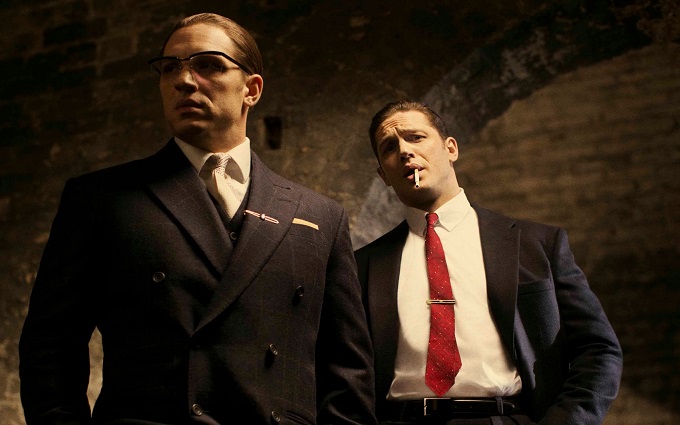Legend Review

The Plot
Tom Hardy tackles the role of the infamous Kray twins in this latest biopic which chronicles the rise and fall of East London’s most notorious gangsters.
The Good
Twenty-five years after two fifths of Spandau Ballet attempted it, the story of the Kray twins is brought back to the big screen with the help of writer-director Brian Helgeland (L.A Confidential). For the most part, Helgeland’s script is informative and entertaining enough to keep the pace going steady. With the beautiful backdrop of 1960s London and an exciting host of classic 60s rock anthems to accompany it, Legend looks and feels right.
Then there’s the cast. Most prominent of which is of course Tom Hardy, who as usual brings a phenomenal performance to the screen, especially while playing two characters. At no point do the Kray twins ever get mixed up along the way, due partly to the wonderful makeup used particularly on Ronnie, the self confessed uglier of the two brothers. This convincing distinction is also due to Hardy’s impressive acting skills. Though it’s a feat seen all over his career to date, to see a new role from Hardy is always a treat. To get double is pure bliss.
Legend is hardly a one man success in its acting however. A supporting cast which includes, among others Paul Bettany, Taron Egerton, David Thewlis, and Christopher Ecclestone, is undeniably an impressive lineup of British talent. Helgeland’s script also manages to give Emily Browning a much meatier role as Reggie Kray’s suffering wife Frances, the film’s narrator. Frances has plenty to do trapped between Ronnie and Reggie’s constant bickering and at times carries the entire focus of the story herself.
On that note, the challenge of having two Tom Hardy’s on the screen at the same time is barely noticeable even when trying to look out for the camera trickery needed to perform such a task. While they tend to share one half of the screen each when seen on screen together, it doesn’t feel as though it’s forced. In fact, in one particular scene the twins become entangled with each other for quite some time as they try to sort out their differences in the only way a pair of east end gangsters would, and the entire sequence looks flawless.
The Bad
Though the cast list is impressive, one particular member feels outright shunned for the entirety of the film. Christopher Ecclestone, who plays Nipper Read, the man determined to bring down the Krays and end their rule of London, feels like an important yet untold story. The prominence of Browning’s character is interesting but at times it feels like this is at the cost of perhaps better areas of the Kray’s history upon which Helgelands script could have focused. The pace is steady yes, but only just and at the price of obvious missed opportunities.
There is also the troubling issue of the way in which Legend manages to explore such a violent and dark era of East London history and yet remain surprisingly light-hearted. Though in its later stages the film reflects more prominently on the way in which the Kray’s difficult ‘career’ as gangsters affected those closest to them, this doesn’t feel enough to warrant the previous two hours or so that had been spent almost gleefully tagging along with them.
Legend displays acting skill and technical accomplishment, but lacks true purpose. The film deliberately avoids entirely portraying the Krays as either irredeemably evil monsters or charming robin hood rogues. Unfortunately avoiding these perhaps overly familiar caricatures leaves audiences with only an ambivalent and indifferent account. Taking liberal artistic licence also severely undermines the film’s documentary credentials, doing surprisingly little to distinguish its from countless other accounts that have traded so easily on the Kray’s notoriety. The film merely perpetuates the Kray ‘Legend’ rather than truly offering anything new on the subject.
The Ugly Truth
Tom Hardy leads the way admirably in a shamelessly stylish look at a dark period of London’s notoriously violent history. Despite Hardy’s impressive and visceral dual role, overall the film misses considerable opportunities, sacrificing depth to focus on a simplified narrative.
Review by Johnny Ellis